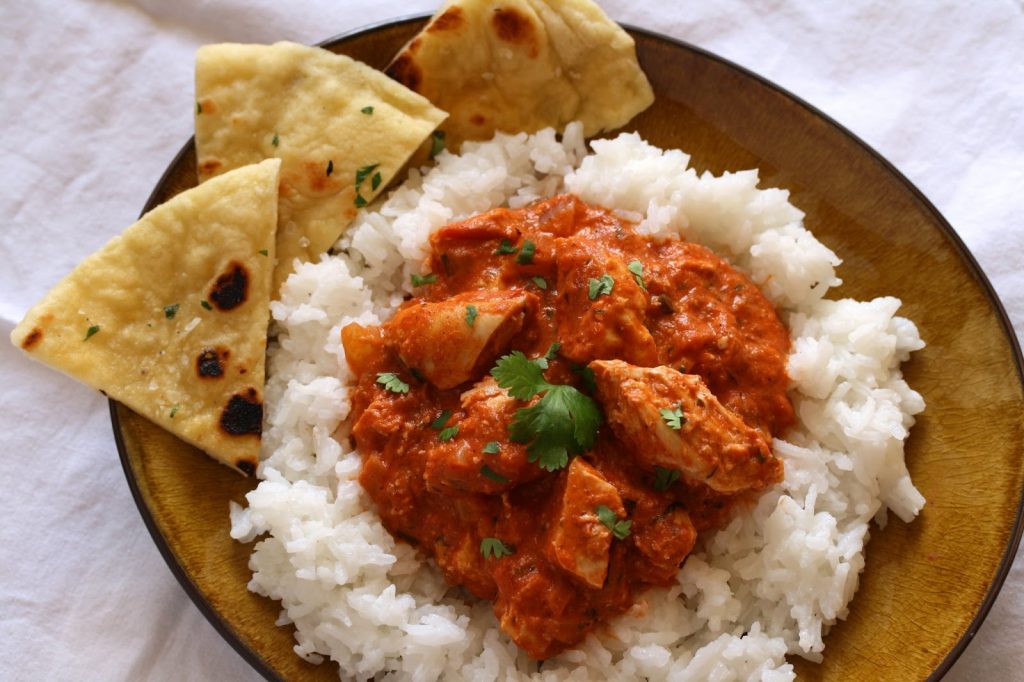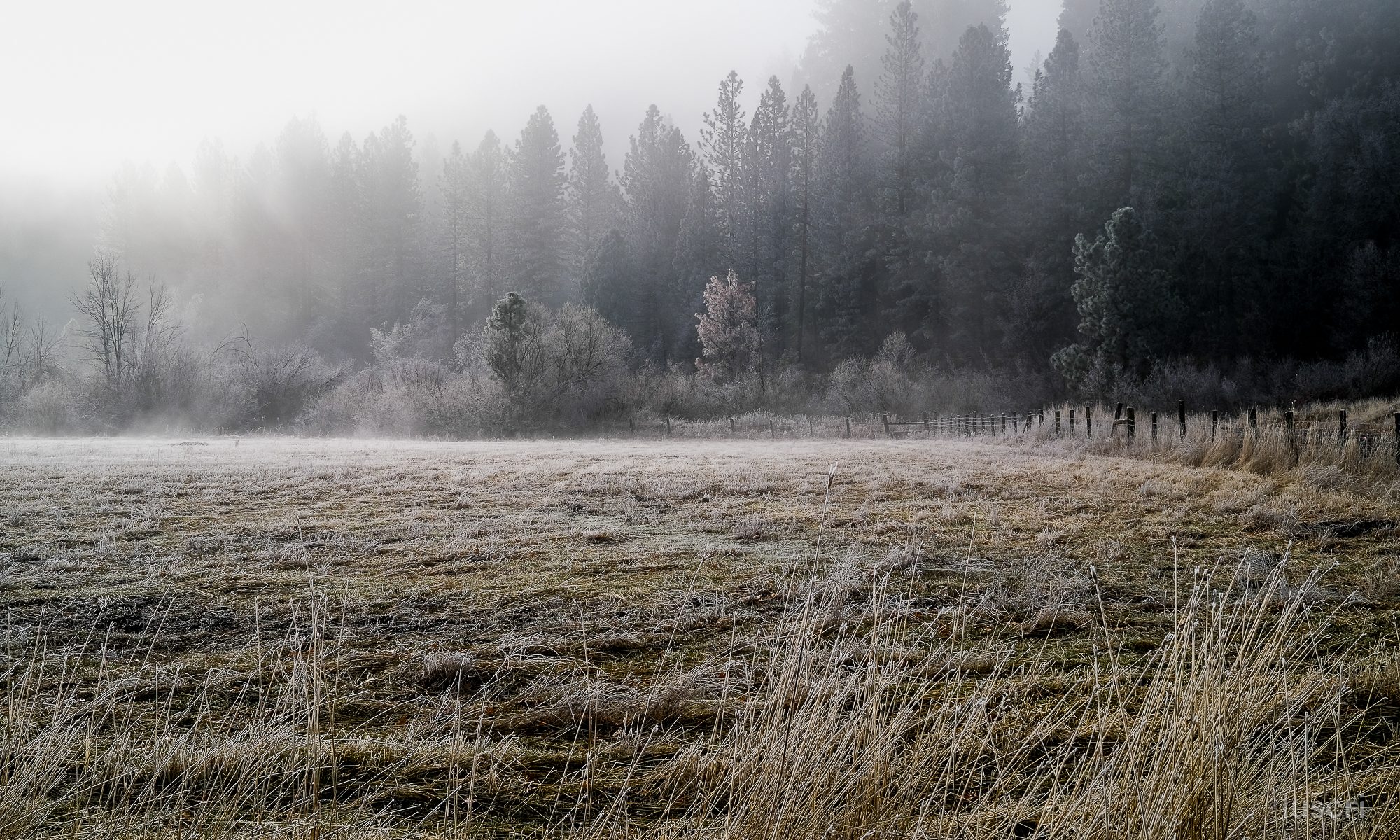
Here’s a Cali cultural caution: Asking an Indian-American how to make chicken tikka masala is NOT AT ALL like asking an Italian-American how to make spaghetti with meat sauce. When hankering for a favorite Indian dish in a tiny California town with no Indian food joint for miles, care is needed—especially for a Texan.
I flunked Cultural Appreciation 101.
Here’s how it went down:
For months, I’d been eating sandwiches in my first California digs—a travel trailer in the barn of a friend and his family. I began craving ethnic cuisine, namely chicken tikka masala. No. Beyond, craving—I had to have it.
In my previous life in North Texas, I enjoyed access to virtually all manner of fare, but in my new mountain town that boasted one Mexican restaurant and one Chinese place, getting chicken tikka masala was a pipe dream.
The Big Blunder
One day my friend’s youngest daughter (sixteen or so at the time)—I’ll call her Clara—introduced me to her Indian-American friend—I’ll call her Nina. I said, “Nice to meet you.” And then blurted, “Hey, do you know to how make chicken tikka masala?” I figured if I couldn’t get it, maybe I could make it.
Clara slumped in her chair and stared at the table while Nina answered politely, “I don’t, but my dad probably does.” Her dad owns a gas station/car wash/mini-mart in town. I thanked her for the tip and went about my day—sans a chicken tikka masala recipe—and blissfully ignorant of the culturally insensitive faux pas I had committed.
I found out later, to my amusement, that after the painful (for Clara) exchange, Nina asked, “Who is that guy?” To which Clara responded, “Oh, he’s the guy living in our barn.”
Cringeworthy Texan
That evening I saw Clara and remembered her slumping, so I apologized for any embarrassment I’d caused her. Turns out, I hadn’t embarrassed her—she was embarrassed for me.
She intimated that by asking her Indian-American friend about an Indian dish I loved, I’d crossed the line because I’d assumed that because Nina is ethnically Indian, she might know how to make a popular Indian dish.
Apparently, it’s culturally insensitive to assume anything based on someone’s ethnicity. Oops. “Well, shucks, I’m just a big ‘ol dumb, backward Texan.”

Cultural appreciation?
Call me crazy, but I would think it’d be gratifying to know that someone of another ethnicity would love one of your ethnicity’s dishes so much that he might ask you how to make it. Seems like a clear case of cultural appreciation to me.
After all, isn’t that what cultural appreciation is all about? Eating?
Apparently, this is what I should’ve said to Nina, “Nice to meet you. You appear to be of Indian descent; may I be so bold as to ask if you are?” Wow. This would make me sound like Dwight Schrute.
Oh, wait, that could backfire. She might have replied, “Why? Because I have dark skin and dark eyes and straight black hair?”
Or she might have simply said yes. Whereupon I could’ve followed with, “Is it at all possible and without meaning any insensitivity whatsoever, but rather only appreciation, might I ask, do you know how to make chicken tikka masala?”
What gives?
Here’s my Texan take:
Clara responded the way she did, in part, because she’s a product of the Zeitgeist—the spirit of the age—that champions cultural diversity over virtually any other social value and regulates its appreciation through the censorship of political correctness.
She perceived my question to Nina as clumsy, backward, and culturally insensitive because she has been unknowingly inculcated with an oversensitivity to “cultural insensitivity” by her California secondary education and her Millennial value system.
Political correctness censors expressions of cultural appreciation by discouraging assumption and stereotypes. Therefore, to avoid offense, one should take great pains to appreciate another’s ethnic and cultural diversity—without saying anything stupid or insensitive.
Texan translation? If you want to know how to make chicken tikka masala, Google it.
For more Cali Crazy Texan takes on the Golden State, here’s part three: Cali Crazy: A Texan’s take on the Golden State—part 3—Holy Holisticism, Batman!

The real irony here is that your “cultural appreciation” lesson took place in one of the least diverse places in Cali. That may be why Clara was ultra sensitive because her Indian-American friend had grown up in a sea of white facing discrimination on a daily basis. That being said, I actually find your story comical because your hankering for tikka masala was simply innocent and it is a shame that a good Indian restaurant could not be found anywhere near this little town.
I love ethnic foods too and it sounds like you moved from a much more culturally diverse city than the small town where this “blunder” occurred. You sarcastically argue that, “it’d be gratifying to know that someone of another ethnicity would love one of your ethnicity’s dishes so much that he might ask you how to make it. Seems like a clear case of cultural appreciation to me. After all, isn’t that what cultural appreciation is all about? Eating?” Unfortunately, food is one of the first objects utilized in cultural appropriation, not appreciation, no matter how well-meaning or innocent, and no, eating is not what it is all about, although I do think you meant that sarcastically. Food can also be one of the richest aspects of a culture that can be appreciated and enjoyed, bringing people of all backgrounds together at a table. I agree that we should not be so afraid as to ask someone about their cultural/ethnic/racial background for fear of not being politically correct, but it is equally important to be mindful and sensitive. From my perspective, as a white, caucasian American, it is the least we can do.
The choice classroom diction including “flunk”, “blunder” and “101” in order to compare your experience to being “schooled” by a millenial, reveals how you really feel about today’s censored, politically correct atmosphere when it comes to our cultural diversity. You call it ironic, and yes, I think it can be when we promote inclusion but exclude freedom of speech, but I also believe that a lot of good can come from practicing cultural sensitivity. I have traveled a lot, I study Latin America and I attend an incredibly diverse university, and I never feel like I have to ignore people’s “visual clues” as you call them, because being “color blind” is not the goal at all. Ask any millenial and I think they would agree with me.
The hypothetical conversation you laid out does not resonate at all with me because I never feel I need to talk that way. I think you jump to a lot of extremes in this article, but its always good to hear a fresh and honest perspective of a personal experience, so thank you for sharing!
Wow. That’s a lot to chew on—and most illuminating! Claire, you’ve just given me enough good stuff (I mean good as in good, no sarcasm intended) as fodder for one or more new posts. I’m glad we can have an honest discussion on these hot topics. Your candor and willingness to debate is refreshing!
One thing to consider: I think you’re mistaking my snark for sarcasm. They are two very different things, and I am rarely sarcastic about anything. This explains the difference quite effectively and amusingly: http://www.thingsyouwishyouknewyesterday.com/blog/2015/1/6/witty-vs-snarky-vs-sarcastic-see-the-difference
LOL. Makes it even worse that chicken tikka masala is a British-Indian dish and not actually something folks eat in India. So it is on one hand kinda like asking someone from Italy how to make spaghetti and meatballs with tomato sauce since they don’t eat that in Italy either.
Fair points, but the origin of chicken tikka masala is disputed: Rahul Verma, a Delhi expert on street food, speculated that it may have originated in the Punjab and Uttar Pradesh, in India. Technically, you may be right about it originating in the UK, or you may be wrong. Has it been culturally appropriated by Britain or India?
Also, I used spaghetti with meat sauce, not meatballs, in my analogy. Meat sauce, or Bolognese sauce, originated in Bologna, in Northern Italy. But you ARE right about the spaghetti part, but remember, I mentioned ITALIAN-Americans and INDIAN-Americans, not Italians and Indians.
Thanks, though—I’m glad you commented.
Ah, then a better analogy would be comparing asking a first generation Indian American in a time of early Indian immigration and a first generation Italian American during a time of early immigration, when stereotypes and ethnic issues are greater. That’s the comparison I was imagining. But even now, asking a first generation Italian American about their family’s historic spaghetti recipes (with any sort of meat or tomato sauce) might elicit some humor/uncomfortability.
Definitely humor for me, but I could see the potential for discomfort. Also, the level of discrimination toward Indian-Americans has to be much more prevalent today than that toward Italian Americans. I’m sure it was different for my Italian grandparents. They wanted to assimilate so badly that they didn’t speak much Italian to my father and aunt, which is a shame because I would like to know more than grazie and prego.
I’m a second generation Italian/Irish-American who loves it when people ask me about pasta or meat sauce recipes because:
1) I get to feign offense and flick ’em the fingers under the chin hand gesture thing … and,
2) I make a pretty good ragu, and after all, the secret is in the sauce ;-).
Thanks for the comment/clarification.
I think a deluge of “sensitivity” demands by the PC Patrol may be behind the election of our current president. people are tired of the pendulum swinging so far in the other direction toward prickly, everything – offends-me PC-Ville.
I think you’re RIGHT ON, Smarmiz. Trump’s win is, in part, a result of a smoldering anger and frustration over the rise and PC and its censor Patrol, as you put it. Thanks for the comment.